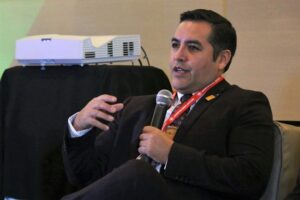Anishinabek Nation Grand Council Chief joins panel on Indigenous governance during student-led conference

By Laura Mayer
KINGSTON – Anishinabek Nation Grand Council Chief Reg Niganobe participated in a plenary panel on Indigenous governance with Wahkohtowin Law and Governance Lodge Director Koren Lightning-Earle and Métis Nation of Ontario legal advisor Zac Thiffault as part of Day 2 of the Queen’s University Conference on Indigenous Reconciliation 2023.
This two-day conference that ran from February 10 and 11 was a student-led initiative with students from both the Smith School of Business and the Law Student’s Society at Queen’s University at the helm. The event focussed on reconciliation in business and law, but also how it can apply to everyday life and different fields.
Each panellist of the Resistance and Resilience: A Panel on Indigenous Self-Governance had the opportunity to speak for 10 minutes to respond to a series of questions focused on how to make steps toward meaningful and lasting reconciliation. Among those questions included who needs to be included in conversations about reconciliation, and what learning and unlearning needs to happen personally and societally for sustainable progress to occur.
Grand Council Chief Niganobe recounted his journey to becoming the youngest Chief in the history of his community, Mississauga #8 First Nation, highlighting the important role played by Elders in guiding and encouraging leadership in their communities. He spoke about the limitations placed on First Nations governance, including the requirement for ministerial approval for bylaws and membership codes. Despite these challenges, his home community has been able to pass several laws, including an Election Code, Membership Code, and Land Code. The community also created guidance around building incidental cabins to empower members to utilize Crown land as recognition of our treaty relationship and seasonal life cycles.
The community then passed its own Constitution that reflects the teachings of its Elders and wasn’t submitted to any Canadian entity for approval. This process started in the 1980s and took until 2015 to be completed. Their current project is concerned with rebuilding systems of Anishinaabe justice that are based in traditional legal principles. Those principles include ideas about the individual gifts, focussing on the behaviour rather than the individual, walking their own path, and making decisions in the best interests of the community. In general, Grand Council Chief expressed the concept that to Anishinaabe people, individual freedoms must be balanced with our reciprocal relationship with the community as a whole.
Grand Council Chief Niganobe also discussed the importance of traditional governance structures, highlighting the role of clans and their decision-making processes in community governance. He emphasized the need for inclusivity and consensus in decision-making and expressed hope for a return to the Dodemaag System (Clan System) in the future. Reconciliation must be based in the empowerment of Anishinabek legal systems to truly be comprehensive.


